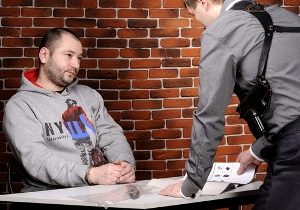We have all seen crime dramas on television. The cops interrogate a suspected criminal for hours until the suspect finally breaks down and confesses to the crime, whether they are guilty or not. You may have watched these shows and wondered if you would ever crack under the pressure and confess to a crime you didn’t commit. A recent study suggests that under the right circumstances, most of us would.
 A study published recently in Psychological Science Magazine found evidence that false memories of committing a crime can be generated in less than three hours with little more than a few bits of misinformation and some encouragement. What’s more interesting is that not only did the majority of the study participants quickly believe they had committed a crime, they even added details of the “experience.”1
A study published recently in Psychological Science Magazine found evidence that false memories of committing a crime can be generated in less than three hours with little more than a few bits of misinformation and some encouragement. What’s more interesting is that not only did the majority of the study participants quickly believe they had committed a crime, they even added details of the “experience.”1
For the study, lead researcher, and forensic psychology lecturer Julia Shaw, of the University of Bedfordshire, and University of British Columbia forensic psychologist Stephen Porter collected facts from the participants who had never been arrested regarding a true experience from their past. Researchers also got information from the parents of the participants regarding their teen years, best friends, and hometown. Over the course of three 45-minute interviews, researchers persuaded 70 percent of the participants that they committed a crime by combining their knowledge of the participant with information fabricated for the study.
Researchers were not interrogating the participants; they simply used known and true information to build a web of false information. The participants were so convinced that they had committed a criminal act that one participant even filled in the details of the crime, including what it was about, the weapon that was used during the assault, and what she was doing when the police came to her house.
Can Police Induce False Memories?
 According to University of California Irvine cognitive psychologist Elizabeth Loftus, memories can be edited. She told NPR that people’s imaginations help them visualize an experience even if that memory and visualization is actually stitched together with pieces of their own past experiences, stories from other people’s experiences, and bits of movies. In this way, the truths of the past can be influenced and edited to make a false reality.2
According to University of California Irvine cognitive psychologist Elizabeth Loftus, memories can be edited. She told NPR that people’s imaginations help them visualize an experience even if that memory and visualization is actually stitched together with pieces of their own past experiences, stories from other people’s experiences, and bits of movies. In this way, the truths of the past can be influenced and edited to make a false reality.2
According to the Ohio Innocence Project, some police interrogations may include the same steps that occurred in the study. The group advocates for the wrongly convicted, and has dealt with cases of individuals giving false confessions. In one recent case, the group advocated for a man who confessed to and was sentenced for a murder in which he could not accurately identify the victim, the clothes the victim was wearing, the weapon, the time of day of the murder, where the injuries were inflicted on the victim’s body, or items stolen from the victim.3
The study reinforces the importance of retaining legal counsel and invoking your right to remain silent if you are accused of a crime. Your criminal defense attorney will get the facts of the case from you, ensure your rights are not violated, and fight the charges aggressively.
Call the Criminal Defense Attorneys at Wallin & Klarich
If you or a loved one is being accused of a crime, it is critical that you contact a Wallin & Klarich criminal defense attorney immediately. Our skilled attorneys have over 30 years of experience successfully defending our clients charged with felony and misdemeanor crimes. We will analyze the facts of your case and plan a defense strategy that will help you get the very best outcome possible in your case.
With offices located in Los Angeles, Sherman Oaks, Torrance, Orange County, San Diego, Riverside, San Bernardino, Ventura, West Covina and Victorville, there is an experienced Wallin & Klarich criminal defense attorney available to help you no matter where you work or live.
Call us today at (888) 280-6839 for a free phone consultation. We will get through this together.
1. [http://pss.sagepub.com/content/26/3/291]↩
2. [http://www.npr.org/2015/01/29/382483367/you-can-be-convinced-to-confess-to-an-invented-crime-study-finds]↩
3. [http://www.innocenceproject.org/news-events-exonerations/ohio-trial-court-tosses-conviction-in-false-confession-case]↩



